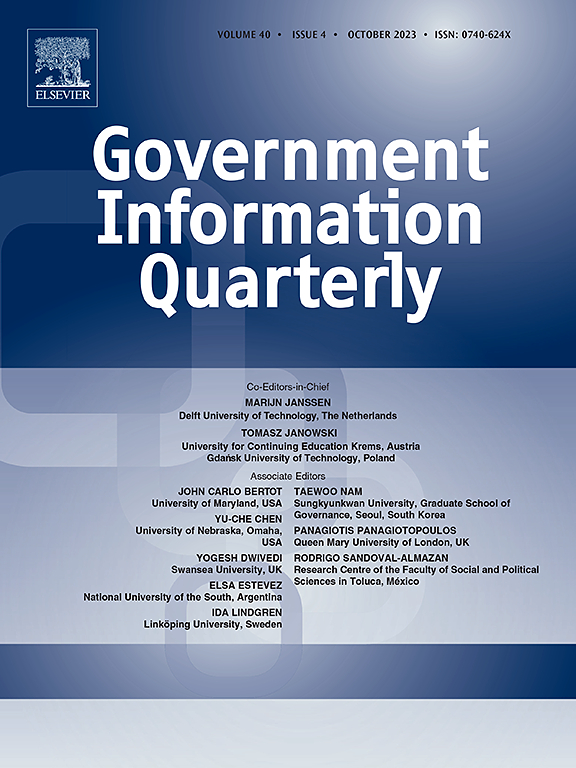Artificial intelligence governance: Understanding how public organizations implement it
IF 10
1区 管理学
Q1 INFORMATION SCIENCE & LIBRARY SCIENCE
引用次数: 0
Abstract
While observing the race for Artificial Intelligence (AI) regulation and global governance, public organizations are faced with the need to structure themselves so that their AI systems consider ethical principles. This research aimed to investigate how public organizations have incorporated the guidelines presented by academia, legislation, and international standards into their governance, management, and AI system development processes, focusing on ethical principles. Propositions were elaborated on the processes and practices recommended by literature specialized in AI governance. This entailed a comprehensive search that reached out to 28 public organizations across five continents that have AI systems in operation. Through an exploratory and descriptive aim, based on a qualitative and quantitative approach, the empirical analysis was carried out by means of proposition analysis using the Qualitative Comparative Analysis (QCA) method in crisp-set and fuzzy modes, based on questionnaire responses, combined with an interview and document content analysis. The analyses identified how processes and practices, across multiple layers and directed at the application of ethical principles in AI system production, have been combined and internalized in those public institutions. Organizations that trained decision-makers, AI system developers, and users showed a more advanced stage of AI governance; on the other hand, low scores were found on actions towards AI governance when those professionals did not receive any training. The results also revealed how governments can boost AI governance in public organizations by designing AI strategy, AI policy, AI ethical principles and publishing standards for that purpose to government agencies. The results also ground the design of the AIGov4Gov framework for public organizations to implement their own AI governance.
人工智能治理:了解公共组织如何实现它
在观察人工智能(AI)监管和全球治理的竞争时,公共组织面临着自我结构的需要,以便他们的人工智能系统考虑道德原则。本研究旨在调查公共组织如何将学术界、立法和国际标准提出的指导方针纳入其治理、管理和人工智能系统开发过程,重点关注道德原则。对人工智能治理专业文献推荐的流程和实践进行了阐述。这需要进行全面的搜索,涉及五大洲28个拥有人工智能系统的公共组织。本文以探索性和描述性为目的,在定性和定量相结合的基础上,以问卷调查结果为基础,结合访谈和文献内容分析,运用定性比较分析(QCA)方法,在crisp-set和fuzzy模式下进行命题分析。这些分析确定了在这些公共机构中,如何跨多个层面并针对人工智能系统生产中伦理原则的应用进行组合和内化的过程和实践。培训决策者、人工智能系统开发人员和用户的组织显示出更高级的人工智能治理阶段;另一方面,当这些专业人员没有接受任何培训时,在人工智能治理方面的行动得分较低。结果还揭示了政府如何通过设计人工智能战略、人工智能政策、人工智能伦理原则和为此目的向政府机构发布标准来促进公共机构的人工智能治理。研究结果还为公共组织实施自己的人工智能治理的AIGov4Gov框架的设计奠定了基础。
本文章由计算机程序翻译,如有差异,请以英文原文为准。
求助全文
约1分钟内获得全文
求助全文
来源期刊

Government Information Quarterly
INFORMATION SCIENCE & LIBRARY SCIENCE-
CiteScore
15.70
自引率
16.70%
发文量
106
期刊介绍:
Government Information Quarterly (GIQ) delves into the convergence of policy, information technology, government, and the public. It explores the impact of policies on government information flows, the role of technology in innovative government services, and the dynamic between citizens and governing bodies in the digital age. GIQ serves as a premier journal, disseminating high-quality research and insights that bridge the realms of policy, information technology, government, and public engagement.
 求助内容:
求助内容: 应助结果提醒方式:
应助结果提醒方式:


